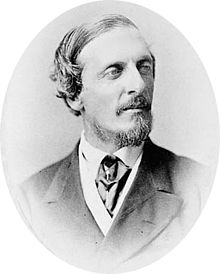
Back لورد دوفرين Arabic لورد دوفرين ARZ Frederick Hamilton-Temple-Blackwood, 1. markýz Dufferin Czech Frederick Hamilton-Temple-Blackwood, 1. Marquess of Dufferin and Ava German Frederick Hamilton-Temple-Blackwood Spanish Frederick Hamilton-Temple-Blackwood Finnish Frederick Temple Blackwood French פרדריק המילטון-טמפל-בלקווד HE लॉर्ड डफरिन Hindi Frederick Hamilton-Temple-Blackwood Italian
The Marquess of Dufferin and Ava | |
|---|---|
 Lord Dufferin in 1873 | |
| Viceroy and Governor-General of India | |
| In office 13 December 1884 – 10 December 1888 | |
| Monarch | Victoria |
| Preceded by | The Marquess of Ripon |
| Succeeded by | The Marquess of Lansdowne |
| 3rd Governor General of Canada | |
| In office 25 June 1872 – 25 November 1878 | |
| Monarch | Victoria |
| Prime Minister | Canadian: Sir John A. Macdonald Alexander Mackenzie British: William Ewart Gladstone The Earl of Beaconsfield |
| Preceded by | The Lord Lisgar |
| Succeeded by | Marquess of Lorne |
| Chancellor of the Duchy of Lancaster | |
| In office 12 December 1868 – 9 August 1872 | |
| Monarch | Victoria |
| Prime Minister | William Ewart Gladstone |
| Preceded by | Thomas Edward Taylor |
| Succeeded by | Hugh Childers |
| British Ambassador to France | |
| In office 1891–1896 | |
| Preceded by | The Earl of Lytton |
| Succeeded by | Sir Edmund Monson |
| Personal details | |
| Born | Frederick Temple Blackwood 21 June 1826 Florence, Stato Vecchio Grand Duchy of Tuscany, Italy |
| Died | 12 February 1902 (aged 75) Clandeboye Estate Bangor, County Down, UK |
| Nationality | British |
| Political party | Liberal |
| Spouse | Hariot Rowan-Hamilton |
| Children |
|
| Parents | |
| Alma mater | Christ Church, Oxford |
| Signature |  |
Frederick Temple Hamilton-Temple-Blackwood, 1st Marquess of Dufferin and Ava, KP, GCB, GCSI, GCMG, GCIE, PC (21 June 1826 – 12 February 1902), was a British public servant and prominent member of Victorian society.[1] In his youth he was a popular figure in the court of Queen Victoria, and became well known to the public after publishing a best-selling account of his travels in the North Atlantic.
He is now best known as one of the most successful public servants of his time. His long career in public service began as a commissioner to Syria in 1860, where his skilful diplomacy maintained British interests while preventing France from instituting a client state in Lebanon. After his success in Syria, Dufferin served in the Government of the United Kingdom as the Chancellor of the Duchy of Lancaster[2] and Under-Secretary of State for War. In 1872 he became Governor General of Canada, bolstering imperial ties in the early years of the Dominion, and in 1884 he reached the pinnacle of his official career as Viceroy of India.
He served as ambassador to France from 1891 to 1896. Following his retirement from the diplomatic service in 1896, his final years were marred by personal tragedy and a misguided attempt to secure his family's financial position. His eldest son was killed in the Second Boer War and another son was badly wounded. He was chairman of a mining firm that went bankrupt after swindling people, although he was ignorant of the matter. His biographer Davenport-Hines says he was "imaginative, sympathetic, warm-hearted, and gloriously versatile."[3] He was an effective leader in Lebanon, Canada and India, averted war with Russia, and annexed Burma. He was careless with money but charming in high society on three continents.
- ^ "Lord Dufferin". The Canadian Encyclopedia.
- ^ Cite error: The named reference
EB1911was invoked but never defined (see the help page). - ^ Davenport-Hines, 2004
© MMXXIII Rich X Search. We shall prevail. All rights reserved. Rich X Search